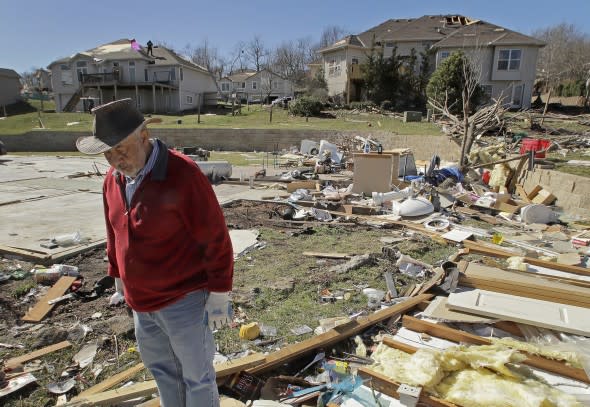Don't wait until it's too late: 5 expert tips for getting your finances in order before a natural disaster strikes
Recovering from the devastation following a hurricane, wildfire, major flood or other significant natural disaster can be even more of a challenge if a person or family isn't financially prepared beforehand.
Over 40 percent of American adults are unable to cover an unexpected expense of $400 or could only cover it by selling something or borrowing money, according to a 2018 Federal Reserve report.
"Being prepared enables you to come back to life as you knew it far more quickly than the average American," said financial adviser Jerry Linebaugh, founder of JLine Financial in Baton Rouge, Louisiana.

FILE - In this March 7, 2017, file photo, Mark Swartz salvages items from his son's home that was destroyed by a tornado after a severe storm passed through Oak Grove, Missouri. (AP Photo/Charlie Riedel, file)
The challenging and stressful burden of rebuilding after a disaster can be eased by having access to essential financial, medical, insurance and other important records, allowing families to start the recovery process much more efficiently.
As September is National Preparedness Month, experts recommend taking the following steps as soon as possible to become financially ready for a disaster.
1. Build up an emergency fund
"The goal for every person or family is to work up to have enough money to cover at least six to nine months of living expenses," said Kevin Gallegos, consumer finance expert and vice president of Phoenix operations for Freedom Debt Relief.
The amount for each household will differ based on location and regular living expenses. Families should also keep in mind that living expenses are different than base salary, Gallegos said. "Keep these savings in an account you can get to in an emergency, but where you will not access and use too easily," he said.
Having at least $300 in cash at a minimum is advised ensuring that it's stored in a safe, waterproof and easy-to-access place in your home, according to Linebaugh.
"If a person makes $3,000 a month after taxes, that's what they need to work toward having in the house," he said. "Cash is king if you're going to be mobile; your ATM and credit cards may not work."
2. Keep a list of important account numbers and passwords handy
Experts recommend creating a list of account numbers and passwords, storing it where you'll be able to access it in an emergency.
A cloud-based password service can keep information accessible, yet safe from identity theft, according to Gallegos.
3. Build a financial emergency kit
Families should have easily accessible records of important documents organized and available in advance of a disaster, according to the Federal Emergency Management Agency (FEMA).
FEMA's website offers an Emergency Financial First Aid Kit to provide guidance on essential information to include in your own kit.
"This should contain, on a flash drive, copies of important identification and financial documents such as birth certificates, property titles and Social Security cards," Gallegos said.
For added security, it can be helpful to send a copy of the flash drive to a trusted relative or friend in another city, he suggested.
"You might wish to do the same thing with copies of important photos," Gallegos said. "Keep the original documents in a secure place, such as a bank's safe deposit box."
He also advised keeping your flash drive in an easy-to-access location so it can be quickly obtained in an emergency.
4. Consider switching to direct deposit if possible
"If you rely on mail delivery for paychecks, Social Security checks or other income and a disaster disrupts postal service, you could be left in a difficult situation," Gallegos warned.
Electronic payments also eliminate the risk of stolen checks, according to Ready.gov.
5. Regularly review your insurance policies to ensure the coverage meets your needs
It's important to make sure your insurance policies cover exactly what you think they are going to cover, according to Linebaugh. "The most common complaint that I hear as a financial adviser after a disaster is, ‘Oh my gosh, I thought my insurance was going to cover this!', and you don't want to have that kind of discovery after [the fact]," he said.
"A homeowner's policy does not cover flood, unless the water originated from a plumbing apparatus, and many policies don't even cover that," he added.
Checking auto, home and health insurance policies annually is recommended to ensure that adequate, up-to-date coverage is provided.
"If you live in or near a possible flood zone, you may need to purchase flood insurance," said Gallegos, advising that families consider FEMA's National Flood Insurance Program.
It's also important to document what you own in case you need to provide this information to your insurance company. "Take photos or videos of all belongings in your home, and keep that, along with insurance agent and policy information, in a safe place," Gallegos said.
Families can find more information on organizing a financial strategy in advance of a disaster from "Disasters and Financial Planning: A Guide for Preparedness and Recovery," a set of guidelines offered by the American Red Cross, the American Institute of Certified Public Accountants and the National Endowment for Financial Education.
For more safety and preparedness tips, visit AccuWeather.com/Ready.

